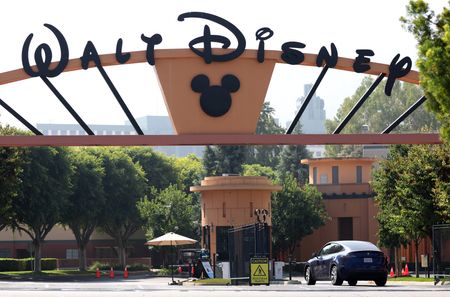By Svea Herbst-Bayliss and Dawn Chmielewski
(Reuters) -Activist investor Nelson Peltz is planning a new board challenge at Walt Disney less than 10 months after the home of Mickey Mouse laid out plans that addressed his criticism.
But with Disney’s stock price down 30% since then, the 82-year-old billionaire investor is now expected to ask the company for “multiple” board seats, including one for himself, a person familiar with the matter said on Monday.
Peltz’s Trian Fund Management owns roughly $2.5 billion, or more than 30 million shares, in Disney, making it one of the entertainment giant’s largest investors, said the person, who declined to be identified because the discussions are private.
The Wall Street Journal was first to report Peltz’s push for board seats.
New York-based Trian has increased its ownership five-fold since the end of the second quarter when a regulatory filing showed it owning 6.4 million Disney shares.
A representative of the hedge fund declined to comment. A Disney representative also declined comment.
Trian had pushed for one board seat for Peltz in January, but ended its proxy fight in early February, saying that Peltz would be watching and cheering Disney from the sidelines, after Disney chief Bob Iger laid out plans to fix the company. Disney had rejected Peltz as a possible board member.
Disney has undergone a period of transformation, restructuring the company and streamlining operations to make the business more cost effective. It is on track to exceed the $5 billion in cost savings it promised investors.
The Burbank, California-based entertainment conglomerate has improved the financial performance of its streaming business, which is losing money but on track to turn a profit by the end of fiscal 2024. Disney also is working to improve the quality of its films, focusing on franchises and major releases, whose profits it seeks to maximize by distributing movies both in theaters and in the home.
Iger also has said the company is evaluating options with regard to its television business, as traditional cable and satellite distributors continue to lose subscribers. In addition, Disney is laying plans to make its flagship ESPN sports network available via streaming at some point in the future.
Disney said it would double its investment in its theme parks over the next decade, spending $60 billion as it develops new experiences based on its “Avatar,” “Frozen,” “Coco” and “Black Panther” film franchises.
But with Disney’s share price dropping from its early February year high of $113.21 to $78.85 on Wednesday, the applause has ended and Peltz is now expected to push hard to join the 11-member board. Disney’s stock price climbed 1.29% on Monday to trade at $83.99 while the broader market was mixed.
If Disney should again deny Peltz’s request to join the board, Trian could nominate director candidates between Dec. 5 and Jan. 4, laying the path for shareholders to vote on whom they would like to see overseeing company strategy.
During the heated but short-lived proxy battle earlier this year, Disney said Peltz, whose firm owned roughly $1 billion worth of Disney stock at the time, did not have the right skills. Trian has about $9 billion in assets.
Facing trouble last year, Disney’s board brought Iger out of retirement in November for a second turn at running the company. At first, his plans to cut jobs and save $5.5 billion appealed to investors.
Peltz – who had pushed Disney to clarify its succession planning, revamp its streaming business, cut costs and bring back its dividend – said in February that the new operating initiatives Iger laid out dovetailed with his thinking.
Iger during the company’s fiscal third-quarter earnings call in August said Disney was mulling strategic partnerships for its marquee sports brand ESPN.
Since the end of the proxy fight, Trian has revamped its top ranks when Ed Garden, one of Trian’s three founding partners and its long-serving chief investment officer, left the firm. Peltz’s son, Matthew, was promoted to co-chief investment officer with Josh Frank.
Corporate governance experts noted that the timing of Peltz’s second board challenge – far in advance of a possible shareholder vote – could favor Disney by giving it a road map of the hedge fund’s demands and more time to fix problems.
(Reporting by Svea Herbst-Bayliss in Rhode Island and Urvi Dugar in Bengaluru; Editing by Krishna Chandra Eluri, Savio D’Souza, Tomasz Janowski and Leslie Adler)

